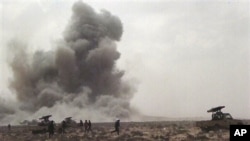A Libyan opposition commander says a deadly airstrike on rebel tank positions may be a case of friendly fire.
Rebel military commander Abdelfateh Yunis said four people died and 14 were wounded in Thursday's strike near the eastern town of Brega. Earlier, Libyan medical officials put the death toll at five.
Some opposition leaders blamed the strike on NATO, accusing the alliance of hitting the wrong targets. Others placed responsibility on pro-Gadhafi forces.
Yunis said if NATO was responsible, the strike was a mistake. But he also said it would be an even bigger mistake if the raid was carried out by forces loyal to Libyan leader Moammar Gadhafi, because that would signal NATO's failure to enforce the no-fly zone.
NATO is investigating the incident. Meanwhile, Western media report a chaotic scene at a hospital in Ajdabiyah where several wounded were taken.
Opponents of Mr. Gadhafi have been asking for NATO planes to protect them in their fight to oust the long-time leader.
Also Thursday, Turkish Prime Minister Recep Tayyip Erdogan proposed a "roadmap" to end the Libyan war. Mr. Erdogan said the plan would include a cease-fire and the withdrawal of pro-Gadhafi forces from some cities.
Rebels have been battling forces loyal to Mr. Gadhafi to retake control of the oil town of Brega, which has gone from rebel to government control and back again several times during the conflict.
Rebel leaders have recently criticized NATO for failing to protect civilians and for not striking pro-Gadhafi military forces quickly or forcefully enough.
The U.S. general who led the initial phase of the international Libya mission said fighting between rebels and pro-Gadhafi forces is turning into a stalemate.
Army General Carter Ham said a stalemate is "not the preferred solution," but is more likely now than when the international airstrike campaign began.
Officials say an international contact group including the United States, European and Middle East allies will meet in Qatar next week to discuss the military intervention in Libya. The French news agency reports that France also is trying to persuade the African Union to send representatives to the meeting on April 13.
The United Nations is working on tightening sanctions against Libya, including adding members of Mr. Gadhafi's family and ministers close to him on a travel ban list.
Human rights groups Thursday also raised new concern about the plight of journalists trying to cover the conflict in Libya.
Reporters Without Borders issued a statement expressing concern for four journalists -- two Americans, a South African and a Spaniard -- who disappeared earlier this week.
The U.S.-based international news website GlobalPost also issued a statement, saying it had been informed by another group, Human Rights Watch, that one of its contributors was taken by pro-Gadhafi forces.
GlobalPost said it appealed to the Libyan government to release American James Foley. It said Foley was traveling with three other journalists when they were detained on the outskirts of Brega.
The other American has been identified as Clare Morgana Gillis, who had been reporting for The Atlantic, a U.S. news magazine.
The news organizations said Foley and Gillis were traveling with Spanish photographer Manu Brabo and South African photographer Anton Hammerl. They said witnesses gave the information to the New York Times, which notified Human Rights Watch.
GlobalPost and The Atlantic said they are working with the U.S. State Department and other organizations to secure the journalists' release.
Some information for this report provided by AP, AFP and Reuters.
Libyan Rebels: Deadly Airstrike Likely Friendly Fire




